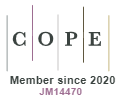Maternal training for home stimulation suggests an improvement in the motor development of preterm infants
DOI:
https://doi.org/10.5585/conssaude.v14n3.5665Keywords:
Child development, Early intervention (education), Infant, premature, Home nursing, Motor skills.Abstract
Objective: To evaluate the motor development of newborn babies with one month of chronological age and compare with the development in the first and third months of corrected age, after maternal training of home stimulation. Methods: We selected six infants born with 33,6 weeks in average, average weight of 1853 g and APGAR ≥ 7 in the fifth minute. The training was performed in five meetings and a book was used to help with home stimulation. The Alberta Infant Motor Scale was used to evaluate development. Results: Lower scores in the scale were observed at the chronological age, evidencing the necessity of age correction. An improvement in the score was observed at the first month of corrected age and it was maintained at the third month. Conclusion: The proposed methodology suggests a tendency to improve motor development of premature infants whose mother performs the premature home stimulation and this may be another therapeutic strategy used by professionals.Downloads
Downloads
Published
2016-01-21
How to Cite
1.
Araujo DM, Ribeiro MF, Espíndula AP. Maternal training for home stimulation suggests an improvement in the motor development of preterm infants. Cons. Saúde [Internet]. 2016 Jan. 21 [cited 2025 May 23];14(3):385-93. Available from: https://periodicos.uninove.br/saude/article/view/5665
Issue
Section
Artigos
License
Copyright (c) 2015 ConScientiae Saúde

This work is licensed under a Creative Commons Attribution-NonCommercial-ShareAlike 4.0 International License.
Views
- Abstract 649
- PDF (Português (Brasil)) 474







